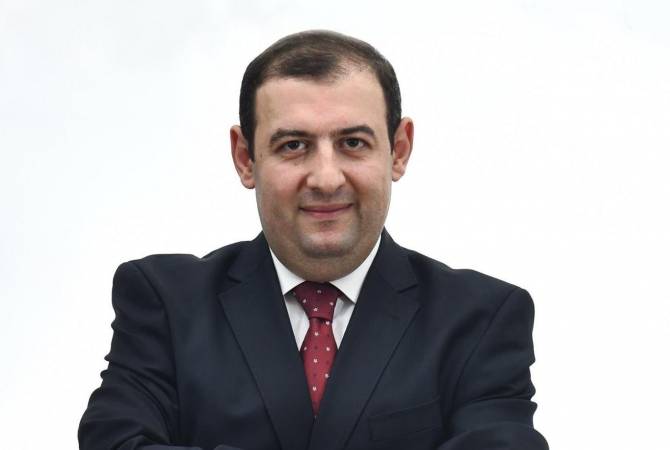Armenpress Calls on World Media to Form Coalition To Prevent Crimes Against Humanity
Jerusalem, 25 April, 2021 (TPS-IL) -- YEREVAN, APRIL 24, ARMENPRESS. Emphasizing the role of the media in raising awareness about the ongoing genocides in the world and strengthening the memory of generations, Armenpress, as the state news agency of the Republic of Armenia, calls on all mass media in the world to form a coalition. Aram Ananyan, director of Armenpress News Agency, said in an interview dedicated to the dissemination of information on crimes against humanity and the importance of international recognition of the Armenian Genocide.
“The World Media Coalition will provide an opportunity to discuss what needs to be done, coordinate activities and move forth by contributing to the prevention of genocides, raising awareness about them and strengthening the historical memory of generations about crimes against humanity,” Aram Ananyan highlighted.
Mr. Ananyan, what is the significance of the recognition of the Armenian Genocide not only for the Armenian people, but also for the international community?
The Armenian Genocide is not just a historical issue, but, from the international legal point of view, it is a crime committed against humanity. A crime that has no statute of limitations, the victims of which are one and a half million of our compatriots. The denial is the continuation of this crime today, which in fact continues the genocidal policy of Turkey. As there is no recognition, there is no relief for the heirs of the victims of the genocide, while recognition is the minimum part of the process, which must be followed by the elimination of the consequences of the genocide.
The recognition of the Armenian Genocide is more than relevant today, because Turkey’s policy has not changed in any way during these 106 years. Besides, the unrecognized Armenian Genocide seems to be untying Turkey’s hands in pursuing a far more daring and cynical policy towards Armenia and the region. It’s obvious that one of the reasons for Turkey’s aggressive behavior in the region is Ankara’s policy of Armenian Genocide denial and countering international recognition. The Turkish involvement in the war in Artsakh once again attests that Turkey has not changed its genocidal policy towards Armenia.
Turkey, by showing extremely aggressive behavior, arming Azerbaijan to the teeth and literally supplying it with representatives of the most dangerous international terrorist groups, showed that it has not dropped genocidal aspirations from the agenda. Ankara attempts to capitalize on its military-political capabilities through threats, armed attacks and proxy groups. Without shying away from utilizing any kind of means and completely ignoring the norms, principles and structures of international law, Turkey is trying to create the impression that the opinion of the world community is of no value to it.
In this case, the international recognition of the Armenian Genocide is an additional straitjacket against Turkey’s aggressive regional aspirations.
In that case, what can explain the silence of the international community?
I do not think that the international community is silent. On the contrary, these issues are stand high on the international agenda. However, Turkey, so to speak, is not strong enough to sit at the same table with the world superpowers, at the same time, it is not sufficiently weak to be on the menu. Through a filthy geopolitical game, Turkey manages to somehow satisfy its ambitions in the region. Recognition of the Armenian Genocide is also necessary to curb Ankara’s appetite.
What will the US recognition of the Armenian Genocide bring?
First, the United States has already recognized the Armenian Genocide, and President Biden’s use of the term “genocide” will pave way for new opportunities for international recognition. For instance, the recognition of the Armenian Genocide by UK and Israel is also important. The UK, which was among the Entente countries during the World War I, was one of the first to react to the Turkish atrocities, but today it is delaying its official recognition for political reasons. In the case of Israel, which survived the genocide and faced the same crime, the recognition of the Armenian Genocide is also of a moral significance.
In case of wide international recognition, the reference to this issue will intensify in the Turkish society, as well. Of course, this is a difficult process; we should not cherish unnecessary illusions, but we should do everything possible and impossible for the Turkish society to embark on the path of repentance.
What should the Armenian and world mass media do for the recognition of the Armenian Genocide and preventing genocides?
If we are talking about the Armenian Genocide in particular, then, figuratively speaking, a significant part of the fact-finding mission, both during and after the World War I, was carried out by the media. It is difficult to overestimate the work done by many media outlets around the world for the international recognition of the Armenian Genocide.
Today, humanity has entered a unique stage of development. On the one hand, events taking place in different parts of the world can instantaneously become public property, on the other hand, genocides and other crimes against humanity are not diminishing. They occur in the eyes of humanity, often influenced by news agendas, political expediencies, or editorial policies.
As the State News Agency of the Republic of Armenia, we call on all mass media in the world to form a coalition to prevent crimes against humanity and protect historical memory.
It is important to raise the level of information and awareness of the international community about such crimes against humanity through the joint and coordinated work of the world media. The World Media Coalition will provide an opportunity to discuss what needs to be done, coordinate activities, and move forth by raising awareness about the genocides, strengthening the historical memory of generations of crimes against humanity, and contributing to the prevention of new genocides.
Interview by Van Novikov


